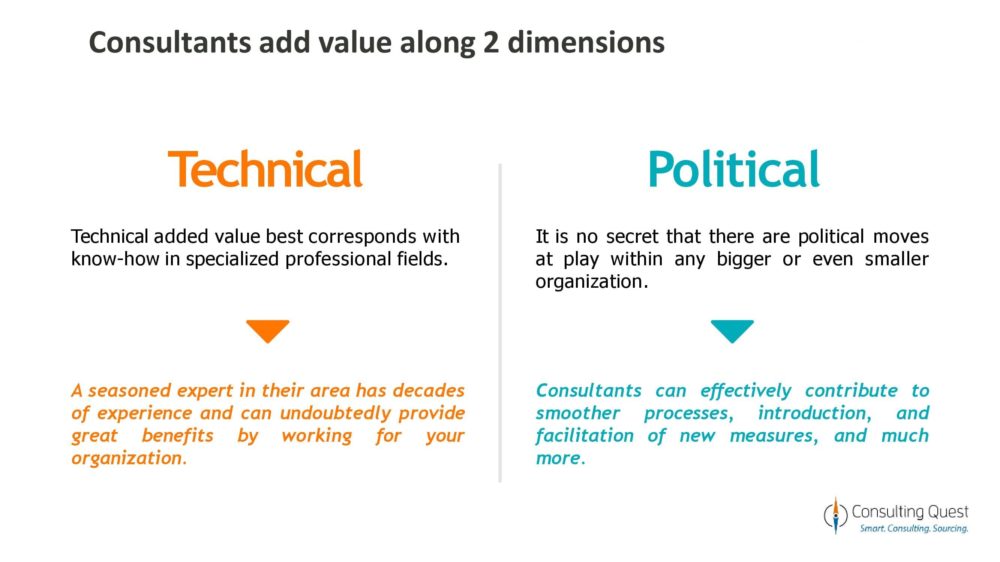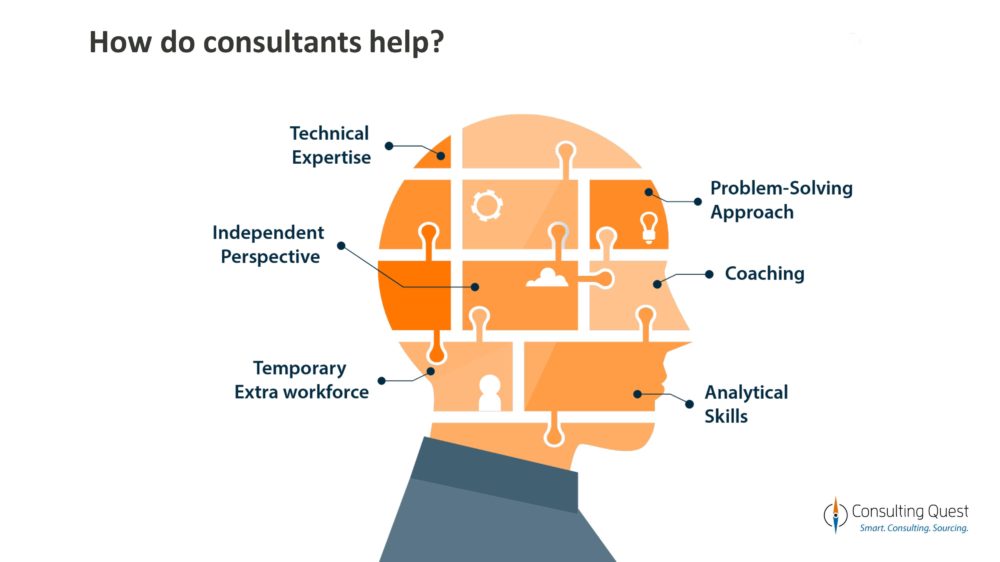
The Value of Consulting
A consultant is an essential and integral part of any organization. They provide critical insights and recommendations that help organizations reach their desired goals. While the role of consultants is often misunderstood, the value they bring to an organization is undeniable. In this article, we will talk more about the value of consulting and why it is so important for organizations to appreciate the hard work done by consultants.
Understanding The Value of Consulting
As a business executive, you are always looking for ways to increase the value of your product. You are interested in discovering innovative methods to enhance your procedures, productivity, and revenue, including some of your challenges.
In response to growing demand, the services industry continues to specialize and segment to meet the diverse needs of its customers. Despite this, many businesses struggle without consultants. So, what do consultants provide the value that some clients recognize but others fail to do so?
There are numerous projects in which partnering with consultants can help businesses create value more efficiently and effectively. As an external service provider, a consultant can frequently see concerns that stakeholders and individuals with too much organizational involvement cannot.
The Value Created by Consultants
Consultants bring various skills to the table, which adds value to the industry or market. Management consultants add value by assisting their clients in improving product quality, growing and expanding the business, lowering costs, retaining valuable talent, etc.
To summarize, most consulting projects contribute to creating value along two dimensions: technical value and political value. The value of consulting lies among these two dimensions.
#1. Technical Value
Technical added value aligns more precisely with expertise in specialized professions. A seasoned specialist in their field has decades of expertise and would unquestionably be an asset to any firm. Now, let’s look at the parameters of technical added-value in order to get an understanding of the value of consulting.
#A. Providing Outside Knowledge
Consultants have deep knowledge of clients, goods, markets, and rivals due to their extensive professional experience. They can conduct surveys, communicate with subject-matter experts, and utilize their analytical prowess in ways inaccessible to clients.
Indeed, the more specialized a consultant is, the greater likely they have encountered similar concerns or worked on related problems. If they are important to you because they have worked with your competitors, they will likely be valuable to your competitors in the future as well.
#B. Accurately Diagnosing a Problem and its Solution
Generally, an organization’s issue is how they ‘see’ the issue. Misdiagnosed or misunderstood issues will exacerbate company complications and steer the team in the wrong direction. They frequently make it more difficult and costly to locate the ideal answer.
The skill of framing and analyzing a problem leads to systematic problem resolution and precise, effective recommendations. A Consultant will often collect, evaluate, and present a treasure mine of information to assist executives to make effective and optimal business decisions.
#C. Assist in the Implementation of the Solution
Consultants can successfully assist with supporting the formulation of a roadmap for capability improvement and securing/accelerating the execution of – project management; additional dedicated resources. Execution, which is the most important phase for achieving the desired effect, includes a heightened level of skill.
Moreover, consultants can also conduct audits of management procedures, which include: compliance with processes and standards and provision of an independent assessment.
#2. Political Value
Political value is much harder to measure and understand because it comes from leadership and the right kind of influence. This means things like making people go along with unpopular changes in the company, making it easier for stakeholders to connect with each other, and so on.
And since consulting is an intangible service, it’s hard to figure out how much it is really worth, But, from a business point of view, it’s worth a lot more to its clients than you might think.
So, what political value do consultants create? There are a few points to look at here in order to get a clear picture of the true value of consulting.
#A. Providing Legitimacy for Decisions…or Be the Scapegoat
An executive can defend a questionable action and have the consultant assume responsibility if something goes wrong. It provides relief for the management team and resembles the plot of a popular criminal thriller, with the consultant assuming the “bad cop” position in order to implement difficult decisions.
#B. Facilitating the Convergence between Stakeholders on a Variety of Issues and Decisions
For example, the CEO of a large US Bank states that he trusts his advisor more than anyone else. Nobody really knows what he does or how much influence he has, but he plays a key role in facilitating alignment and improving relations among key stakeholders.
At the same time, he helps with analyzing situations for possible solutions from different angles before arriving at one decision. He also interviews those involved while making sure everyone is satisfied. And he does all of this while being able to remain impartial throughout it all!
#C. Acting as a Trusted Advisor
Playing the role of a trusted advisor to bounce ideas when CEOs can’t exchange with their teams is quite valuable. CEOs cannot discuss anything and everything
with their leadership team. Besides, the trusted advisor will not have an agenda and can provide an unbiased second opinion.
#D. Enforcing Unpopular Changes
Consider cost-cutting initiatives and restructuring. These can, of course, be led internally, but it can be challenging to find volunteers to execute difficult decisions or to advocate eliminating a portion of the workforce.
How To Measure the Value of Consulting?
The value of consulting can be measured through the value added by the consultants. To measure the true value of consulting, we’ll have to look at the following three ways.
#1. Measuring Tangible Benefits
The tangible benefits have a direct impact on the profit and loss statement. They are easier to measure because they are frequently quantifiable.
Increasing Revenues: The work you conduct with your consulting provider can help you boost your bottom line by increasing sales, improving sales margins, or gaining market share.
Reducing Costs: The consulting project can help you save money in a variety of ways, including increased efficiency, better-organized and sourced purchasing, and more.
Avoiding Costs: This is a more difficult assessment. However, it is frequently possible to calculate the cost avoided as a result of increased reliability, focus, or capacity (assets and workforce expansion).
Improving Cash/Working Capital: Lastly, financial indicators such as cash and working capital optimization, inventory usage and management, enhanced and optimized Payment terms, development of better Financing options, and payment/credit terms can all be recognized as benefits from a consulting project.
#2. Measuring Intangible Benefits
In the absence of a clear approach, it is much easier to pinpoint specific effects on P&L. Nonetheless, there are other sectors where the measurement of subjective or intangible aspects takes place.
Culture, Diversity & Inclusion, and Talent Management: In management literature, there are many examples of how a new culture improved innovation, diversity and inclusion led to better decision-making, or an efficient talent management system helped bring in and keep exceptional employees. All these results affect a company’s success and the team’s value, however hard it is to define them.
Process & Systems Optimization: Streamlining your processes and systems can only result in improved customer service and increased company value. For instance, gaining a half-day on a 5-day process could allow you to service 10 percent more clients with the same personnel, which would have a direct impact on your top-line while having minimal impact on your costs.
Long-term Impact of the Transformation Program on the Value of the Company: If you implement a transformation program that transforms a firm from a commodity player valued at x7 to a specialty player valued at x10, you have produced enormous value for your company and its shareholders.
#3. Measuring Projects’ Performance
An excellent practice while utilizing consulting services is to carefully analyze the performance at the conclusion of each project. This evaluation may consist of an interview or an online questionnaire. This performance evaluation should address the project’s primary goals, its execution, and a qualitative evaluation of the return on investment.
Direct feedback from clients and satisfaction can be an excellent indicator of investment return. Indeed, clients will be immensely delighted if the work is well-done and they perceive that the money invested on the project was well-spent.
In contrast, if the client is content with the work but believes the project was too expensive, it is likely that the return on investment was low. If the consultant does not like to directly inquire about the return on investment, they can obtain a good proxy by inquiring whether the clients would recommend utilizing the firm again.
5 Takeaways for Busy Executives
- Too many businesses look at consulting as an extra resource or as part of the project they are working on. Very few executives really know what value they bring to the table.
- As a third party, a consultant can often see problems that stakeholders and people who are too close to your organization can’t.
- Consultants can add a lot of value to their clients’ businesses.
- The value created can be technical, like providing expertise and solutions to different problems, political, like helping clients make transitions, implement new policies, and adapt to new environments, or any combination of these.
- Client feedback and satisfaction can be used to measure how well a project is doing.
If you want to learn more about the value created by consultants (the true value of consulting), you can watch our webinar How Procurement Can Create Value When Buying Consulting Services.
Hélène Laffitte is the CEO of Consulting Quest, a Global Performance-Driven Consulting Platform and author of “Smart Consulting Sourcing”, a step by step guide to getting the best ROI from your consulting. With a blend of experience in Procurement and Consulting, Hélène is passionate about helping Companies create more value through Consulting.






